Plus ca change.
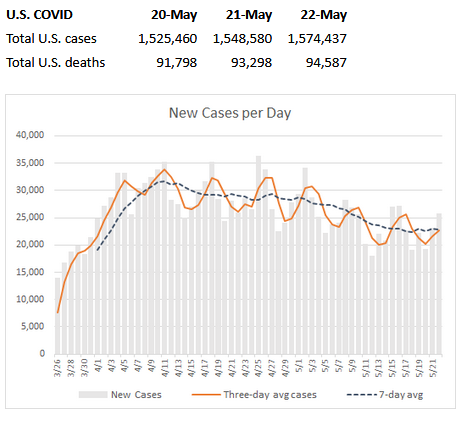
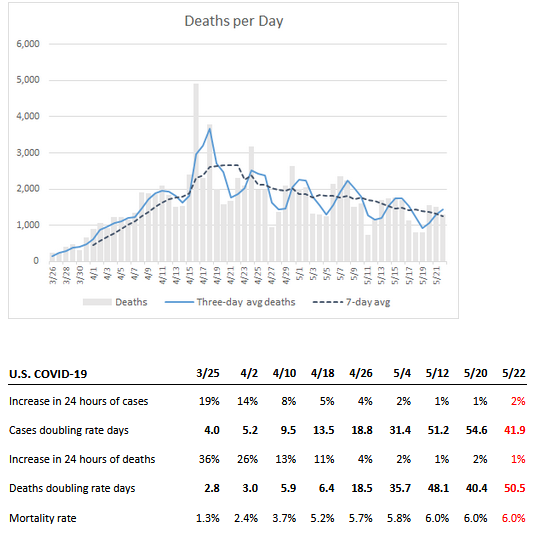
The results of the work I do, like this article, are free, but food isn’t, so if you value my work, please DONATE or SUBSCRIBE.

Plus ca change.


The results of the work I do, like this article, are free, but food isn’t, so if you value my work, please DONATE or SUBSCRIBE.
•Spain 5%
•Italy 5%
•Sweden 5%
•Holland 3.5%
•Denmark 1%
•Norway 1%
•Ireland 6%
You will recall that Italy has had one of the worst outbreaks in the world. To get to herd immunity (assuming it’s possible for Covid-19), you’d need about 80 percent of the population to have antibodies; that means 16X more than have them now. Given that Italy had multiple hospitals overwhelmed, this means either a long time or a hell of a lot of dead people, or both. Even if the death rate didn’t soar (it would), you’d be talking about approximately 480K deaths.
This means there are only two ways to get rid Covid-19 under control:
That’s it.
Well, there’s a third way, you go through multiple waves so that almost everyone catches it, meaning that you get much, much larger death tolls than we’ve had already.
So, don’t expect this to go away quickly if you’re in a bungler country which didn’t crush Covid-19 into the dirt and which refused to track, trace, quarantine, and mandate masks.
And if you live in one of those countries, expect that you aren’t traveling anywhere outside those countries without a two-week quarantine (if even that is allowed by your destination country) until there is a vaccine.
There are respected scientists on both sides of the “can we get a vaccine to this” question. My sense is that if we can, it’s about a year to eighteen months out before mass issue. Hopefully, it isn’t a company in the American IP zone that produces it, or they’ll try and make a trillion + by charging everyone through the nose for it.
Meanwhile, this situation is going to keep going on and on, especially if you’re in a bungler country. Americans, you’re in a Bungler country. Brits, same.
Be well, make your plans appropriately.
The results of the work I do, like this article, are free, but food isn’t, so if you value my work, please DONATE or SUBSCRIBE.
Our benefactor writes:
May 21. We’re living in a slow-motion Cormac McCarthy novel, a death march without the nuclear holocaust. It almost feels like the first wave was a warm-up to get used to seeing so many cases and deaths. Unless, of course, you get really sick or die, those people don’t really appreciate the lack of concern….100,000 deaths before the end of May. Hard to fathom.
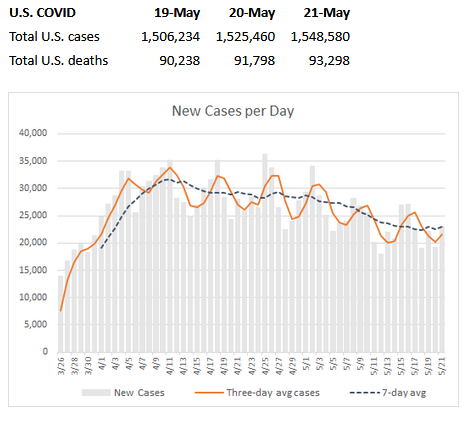
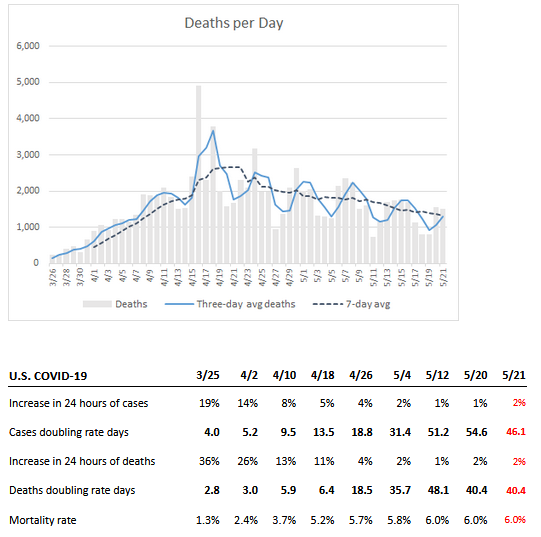
The results of the work I do, like this article, are free, but food isn’t, so if you value my work, please DONATE or SUBSCRIBE.
Our benefactor writes:
It appears that our data source is now only updating once per day and has made it almost impossible to easily download individual states’ data. I am also carefully subtracting data every day for Puerto Rico, Guam, Virgin Islands, and American Samoa, because they were always excluded, primarily due to inconsistency in the data sources.
Ongoing slow decline. We’re reading lots of noise about irregularities in reporting deaths in GA and FL. Tamping down cases is easy – just restrict testing. The reporting of deaths is evidently also being changed in a number of states to the reporting day by the local medical examiner or health official, not to the actual death. CO, GA, and FL, among others are now doing this. The net effect is simply to create a temporary reduction in the number of deaths for a period of time until they catch up again. It appears that this can be up to a several week lag, which is what a lot of the states want to create the optics for opening up.
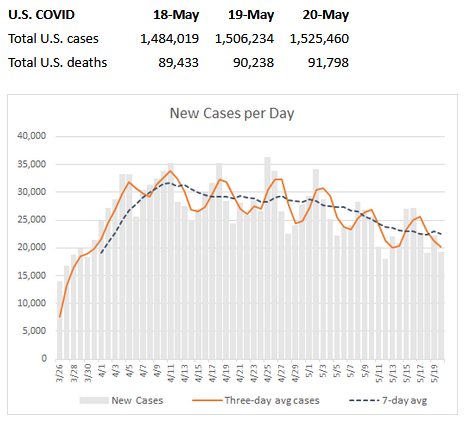
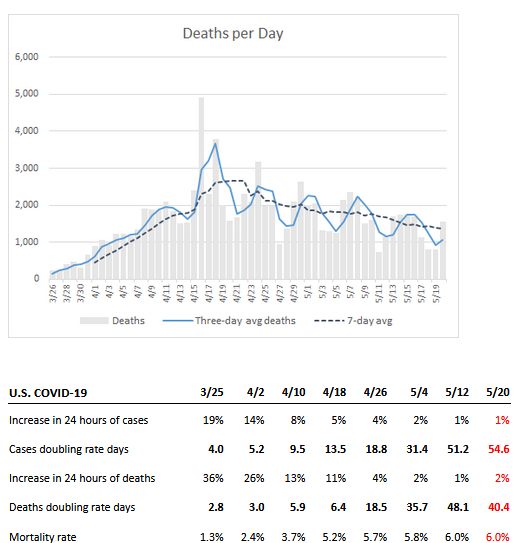
The results of the work I do, like this article, are free, but food isn’t, so if you value my work, please DONATE or SUBSCRIBE.
There is a vast amount of hand-wringing and angst going on about how we can either save the economy by re-opening, or we can let the economy crash and save lives. Of course, the economy crashing (and the US unemployment rate will probably hit 30 percent) will cause the loss of lives also.
This is a manufactured, completely unnecessary choice.
To understand why, you have to understand three facts about money:
What Covid-19 closures are doing is providing feedback–“people with money want less of these things.” That causes the people who control businesses, or live in apartments, or have to pay mortgages to run out of money, and lose control of those things. Businesses go out of business. People can’t pay rent or mortgages or their employees.
That causes an economic crash.
This is 100 percent unnecessary. We want feedback in an economic system because we don’t want people doing things that other people don’t want or need (or, in Capitalism, other people with money).
But when a one-time event happens which does not reflect a fundamental shift in what people want (i.e., this pandemic will end) then you actually want to stop the feedback, because it’s bad feedback. You don’t want to change long-term economic arrangements because of something that is a one-time event.
So, because money is fictional, because we just create it out of thin air (central banks create trillions routinely), this means that we can do one of two things:
Or, of course, we can (and should) do a combination of these two things.
When Covid-19 closures have clearly run their course, we stop doing these things. If there are permanent changes (a lot of people keep working from home, or we don’t get a vaccine and restaurants aren’t going to be popular again) at that point the feedback is allowed to operate.
To allow a one-time event of limited duration to fundamentally reshape the economy means one misunderstands what an economy is. An economy is not money, it is people, land, and objects. Those are what must be preserved, not money. When the one-time event is over, if those objects still exist and are still controlled by people who can use them to create what other people want, then the economy has been preserved.
To allow people to die to preserve the economy is idiocy: It hurts the economy. People are the economy; it is people and natural resources which produce everything of value.
So, when people squeal about the economy vs. lives, understand that they don’t know what an economy is or how money works. Or, they do know how money works and what an economy is, but they are taking advantage of the situation to give themselves more money, and are good with other people dying while they get more money, because they are concerned with their relative position.
If the Fed and the government give rich people lots of money, and everyone else not much, and if assets become cheap and can be bought out, and if small businesses go out of business, at the end the economy is smaller, BUT the rich people control more of it
And that’s what they want. Too bad your grandma and your dad have to die for it, but that’s not their problem.
The results of the work I do, like this article, are free, but food isn’t, so if you value my work, please DONATE or SUBSCRIBE.
Our benefactor writes:
This is the first time in awhile that the seven-day average for new cases has noticeably increased. We have surpassed 1.5 million cases and 90 thousand deaths.
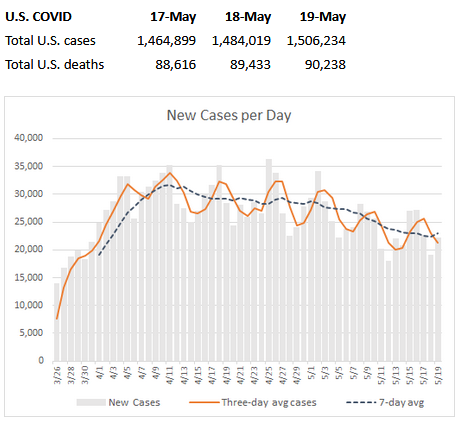

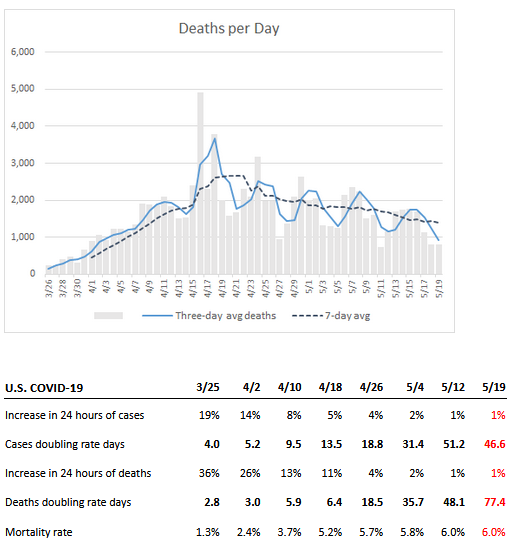
The results of the work I do, like this article, are free, but food isn’t, so if you value my work, please DONATE or SUBSCRIBE.
More slow decline.
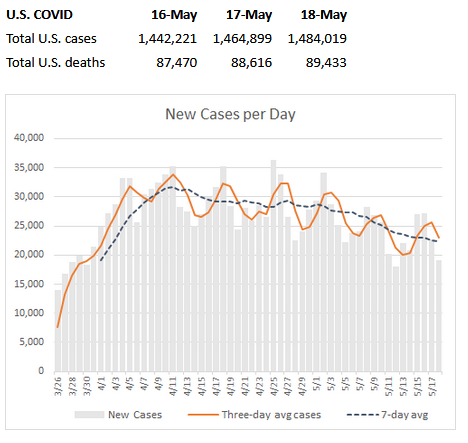
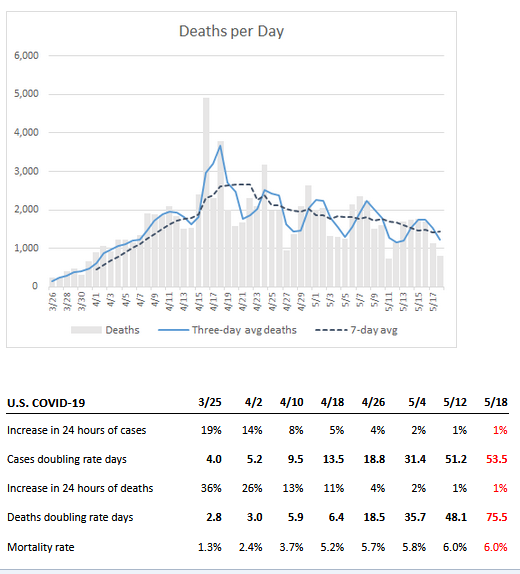
The results of the work I do, like this article, are free, but food isn’t, so if you value my work, please DONATE or SUBSCRIBE.
by Tony Wikrent
[WaPo, via Naked Capitalism 5-11-20] A must read.
Four relatively narrow policy questions hint at the difficulties ahead. First, the bailout: After the initial $349 billion allotment vanished in days, Congress threw an additional $320 billion into the Paycheck Protection Program, the effort to keep small-ish businesses from firing employees for roughly eight weeks. That just means companies, including many I’ve spoken to, are planning June layoffs. Will Washington put another $670 billion into the PPP just to keep those small businesses afloat through July?
….Third, states and cities are going broke, thanks to the costs of responding to the crisis — from unemployment claims to boosting hospital capacity and purchasing protective equipment — as well as the collapse of income, sales and meal tax payments. New York City says it will need $7.4 billion in federal aid, and the state faces a $13 billion shortfall; Alaska’s budget gap might top $1 billion; Colorado’s, $3 billion. The impact on California’s finances has been termed, simply, “beyond crazy.” That will be true for every single state, every single county, every single city, village and town in the country. Unlike the federal government, which can deficit spend with abandon, state and local governments must balance their budgets, meaning these holes must be closed, immediately, by federal aid, budget cuts or tax increases….
Addressing the Great Depression took enormous creativity and agility by Franklin Roosevelt’s New Dealers; it required massive new social programs, employment efforts that transformed the country and targeted individual industries, right down to literally paying writers to write about the Great Depression. The federal response to that crisis also underscores how large and long the U.S. government’s present-day interventions might need to be. When FDR ran for reelection in 1936 — four years into his New Deal — unemployment still stood above 16 percent, and rural electrification, a cornerstone of the New Deal’s economic development efforts, would take more than a decade to unfold.
It’s clear that we as a country need to be thinking in terms of tens of trillions of dollars of federal effort over the next decade. Planning in terms of weeks and $1,200 stimulus payments certainly helps now, but it’s no Marshall Plan. Every hour and day that the federal government fails to recognize the scale of this problem, the problem gets worse — and the solutions will be harder and more expensive.
Our response here in Congress must match the true scale of this devastating crisis. The Heroes Act—while it contains many important provisions—simply fails to do that.
David Sirota [via Naked Capitalism 5-16-20]
Matt Taibbi [via Naked Capitalism 5-16-20]
America’s digital Sputnik moment
[The Hill, via Naked Capitalism 5-13-20]
Powered by WordPress & Theme by Anders Norén